Donated Bicycles: Opening Doors and Changing Lives
 Bicycles are essential to communities in developing countries. A bicycle provides an advanced mobility that allows for heavier loads, faster trips, less wear and tear on the body and, happily, the chance for recreation. A person’s day will include more accomplishments in less time.
Bicycles are essential to communities in developing countries. A bicycle provides an advanced mobility that allows for heavier loads, faster trips, less wear and tear on the body and, happily, the chance for recreation. A person’s day will include more accomplishments in less time.
Bicycles mean productivity. And donated bicycles mean opportunity.
Getting the Donated Bicycles
Entrepreneurs and nonprofit organizations alike have become forces in mobilizing citizens with donated bicycles. Mike’s Bikes, a California-based bike shop, partners with other area businesses and organizes bike drives to fill shipping containers full of used bicycles and spare parts. Like Mike’s Bikes, Bicycles for Humanity ships bikes and parts in containers, and both organizations outfit the containers so they can become bike shops for the village in which they land. Bicycles for Humanity even refers to their containers as Bicycle Empowerment Centers.
World Bicycle Relief produces new bicycles, known as Buffalo Bikes, through monetary donations. They are built specifically for the rugged conditions of the particular region, with puncture-proof tires and a heftier frame for carrying more cargo. Bicycles Change Lives also produces new bicycles, naming its program Qhubeka, a Nguni word that means, “to progress,” or, “to move forward.”
Creating Jobs
Bikes for the World also ships donated bicycles and parts in large containers. The organization focuses on Africa, Central America and the South Pacific, and works with partners like the Village Bicycle Project in Ghana and Sierra Leone and the Madagascar Community-Based Integrated Health Project (MAHEFA) in Madagascar.
In El Salvador, the Salvadoran Center for Appropriate Technology (CESTA) has built up an impressive bike shop, and an equally impressive program for training at-risk youth to work in it through the reconditioning, repair and maintenance of bikes. CESTA runs EcoBici, the training program aimed at helping young people build skills and stay out of gangs.
Donated bicycles are so vital that, as the youths learn to eventually manage their own shops, they find themselves at the center of their community with positive engagement and interaction. For people of all ages, the village bike shop has become an integral component in developing countries as a productive hub for societal and industrial activity.
Healthcare Workers and Their Patients
Remarkably, bicycle transportation improves health in rural areas, and not just for the rider. Amid the health crises in regions of Africa, trained healthcare workers and volunteers do all they can to visit patients in their homes and in hospitals, but are often traveling on foot.
In Zambia, one community volunteer, Royce, works to help citizens of her village by testing their HIV/AIDS status and educating them on prevention and treatment. Before she received her bike, she would walk seven kilometers each day to visit three patients. Now, thanks to World Bicycle Relief, she travels on two wheels and visits 18 patients, including vulnerable children, in a single day. “I’m always happy when I ride my bike,” says Royce. “People in my community recognize me. They say, ‘There goes our caregiver on her bike.’”
Elsewhere in Zambia, three healthcare volunteers, Gertrude, Robert and Francis, who work to prevent and treat malaria in their region, enjoy a similar experience when they are recognized on their bright orange Buffalo bikes, painted so for the 1500 health workers in the area. “When they see the bikes,” says Robert, “they know we have come to fight malaria.”
Statistics at World Bicycle Relief show that the over 138,000 Buffalo Bike-mobilized healthcare workers can reach 45 percent more patients and travel four times further than was possible on foot.
Education and Empowering Girls
The greatest challenge for most children wanting to attend school in developing countries is simply getting there. World Bicycle Relief statistics point out that the attendance of a student with a bicycle increases up to 28 percent, while their academic performance increases up to a dramatic 59 percent. And for girls, completing their education means they are six times less likely to become child brides.
For one 15-year-old girl, Ethel, a two-hour trek to school across rough terrain is now a 45-minute bike ride. Being on time helped her become a confident and exemplary student. Ethel even began using her bicycle to transport fellow classmates to school.
Education is key for the progressing dimensions of developing nations, including breaking the cycle of poverty. From 2009 to 2016, over 126,000 students have received Buffalo Bikes through World Bicycle Relief.
The advantage of mobilization by donated bicycles for workers, healthcare volunteers and students is tremendous. It also reaches farmers and small business operators who can travel greater distances with more wares to sell. It reaches citizens like businessman Ernest in Ghana, who gets his work done earlier in the day and can now coach a local youth soccer team in the time he’s saved. It reaches 14-year-old Koketso, who says there is now a cycling club at her school and that she’d like to take cycling up as a sport.
“With my bicycle,” Koketso says, “I can visit a lot of places that I have never seen before.”
– Jaymie Greenway
Photo: Flickr
![]()
